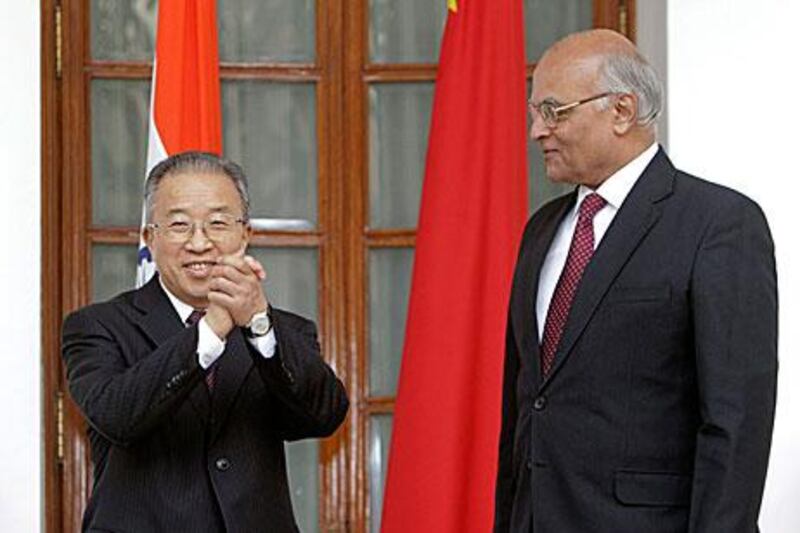NEW DELHI // India and China resumed border talks yesterday in the shadow of unprecedented militarisation along their shared boundaries.
The talks were postponed last November over an appearance by the Dalai Lama in New Delhi last year.
Little was expected from yesterday's talks - the 15th round since the process began in the 1980s - with both sides still trying to outline the basic framework that will allow them to resolve their long-running border disputes.
Chinese infrastructure build-up along the border has become a major source of concern for India, which increasingly sees China as a longer-term threat to its security than traditional rival Pakistan.
The Indian government last month approved a US$10 billion (Dh35bn) military development programme for its border regions, including new fighter bases, helipads, and plans for more than 5,500 "permanent defences and bunkers" along the Line of Actual Control with China. That comes on top of another US$10 billion announced earlier in the year for a new mountain strike infantry corps, that will give the army a total of 75,000 troops in the region.
The Indian Army says this is necessary to meet a possible attack by up to 30 Chinese divisions based in Tibet.
India and China - who fought a war over their 2,000 kilometre boundary in 1962 - signed an agreement in 2005 saying they were committed to finding a solution.
But since then, the negotiations have made little headway, with minor issues often interfering.
Yesterday's talks were postponed in November after reports that Beijing objected to a scheduled speech in New Delhi by the Dalai Lama, who China's Communist government labels a separatist.
Relations between the two countries were in a rut in 2011, highlighted by some belligerent comments by China last summer about India's oil exploration in the South China Sea, which China considers its exclusive zone of influence.
Both sides seem keen to start the new year on a more positive note. The Times of India carried a prominent story over the weekend in which the top army commander for the northern region, Gen KT Parnaik, emphasised there was "no threat from China".
In an editorial in The Hindu newspaper, the State Councillor Dai Bingguo, who is leading the Chinese delegation, wrote: "There does not exist such a thing as China's attempt to 'attack India' or 'suppress India's development'.
"While working hard to develop itself, China is fully committed to developing long-term friendship and cooperation with India."
Such warm words have not stopped both countries from carrying out unprecedented militarisation along their borders.
India is also concerned about China's deployment of nuclear missiles along the border, which have the capability to hit any major Indian city.
[ foreign.desk@thenational.ae ]
Follow
The National
on
[ @TheNationalUAE ]
& Eric Randolph on
[ @EricWRandolph ]





